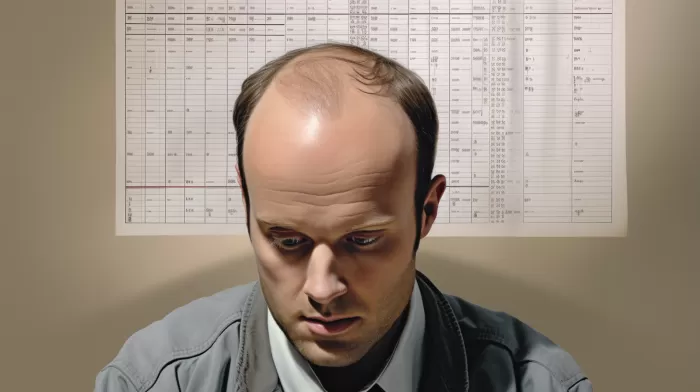If you are among the men who started losing hair as early as the age of 20, you need to be aware of an increased risk for prostate cancer in your later years. In such cases, it’s highly recommended to go for regular screenings for the disease. Recent research published in the Annals of Oncology indicates that men whose hair started thinning by the time they were 20 are twice as likely to develop prostate cancer. However, if you begin to lose your hair in your 30s or 40s, this increased risk does not apply to you.
Connection between baldness and prostate cancer
Androgenic alopecia, also known as male pattern baldness, affects 50% of men at some point in their life. A connection has been found between androgenic hormones and baldness. These very same androgens not only play a significant role in the development and growth of prostate cancer but also in hair loss.
Researchers have been exploring the relationship between early hair loss and the risk of developing prostate cancer. After examining the prostate health of nearly 600 men, it was found that men with early hair loss (before the age of 20) were twice as likely to have prostate cancer.
Understanding the role of androgens
Androgens are crucial male sex hormones that are responsible for the development and maintenance of male characteristics. Testosterone, an androgen, is converted to dihydrotestosterone (DHT) by an enzyme called 5-alpha reductase. DHT attaches itself to androgen receptors in the hair follicles, causing them to shrink. This ultimately leads to hair loss and, eventually, baldness.
Besides contributing to hair loss, androgens also stimulate cell growth in the prostate gland. When there’s an excess of androgens, this can lead to uncontrolled cell growth, which may turn cancerous. The presence of androgens is, therefore, a significant contributing factor to the risk of prostate cancer.
The importance of regular screenings
Since there is a clear link between early hair loss and an increased risk of prostate cancer, it is essential for men experiencing early baldness to undergo regular screenings for prostate cancer. Screenings typically involve a blood test that measures prostate-specific antigen (PSA) levels to determine one’s risk. High PSA levels may indicate the presence of cancerous cells.
However, PSA tests are not conclusive and may produce false positives or negatives. For a more accurate diagnosis, different tests like a digital rectal examination (DRE), prostate biopsy, or magnetic resonance imaging (MRI) can be opted for.
Some medical professionals suggest waiting for symptoms to appear before cancer screening, but early detection is crucial for cancer treatment. Men aged 55 to 69 should ideally be screened for prostate cancer every two to four years, depending on the PSA level. For those who experienced hair loss at an early age, regular screening is highly recommended, though you should consult with your healthcare provider about the best plan for you.
Preventive measures and lifestyle changes
To reduce your risk of prostate cancer and possibly slow down hair loss, consider making certain lifestyle changes, such as:
- Maintaining a healthy diet: Incorporate foods rich in vitamins, minerals, and antioxidants, including fruits, vegetables, lean meats, and low-fat dairy products. Reduce your intake of saturated fat, red meat, and processed meats.
- Exercising regularly: Aim for at least 150 minutes of moderate-intensity aerobic activity every week, along with strength training exercises.
- Managing stress: High cortisol levels can contribute to hair loss and impact your overall health, so try incorporating stress reduction techniques, such as yoga, meditation, or deep breathing exercises.
- Getting enough sleep: Aim for at least 7-9 hours of sleep per night to help regulate your hormone levels and maintain a healthy immune system.
In conclusion, if you notice significant hair loss before the age of 20, it is essential to be aware of your elevated risk for prostate cancer. Consult with a healthcare professional and consider regular screenings for early detection and better treatment outcomes. Additionally, adopting a healthy lifestyle can help lower your risk of cancer and potentially slow down hair loss.



